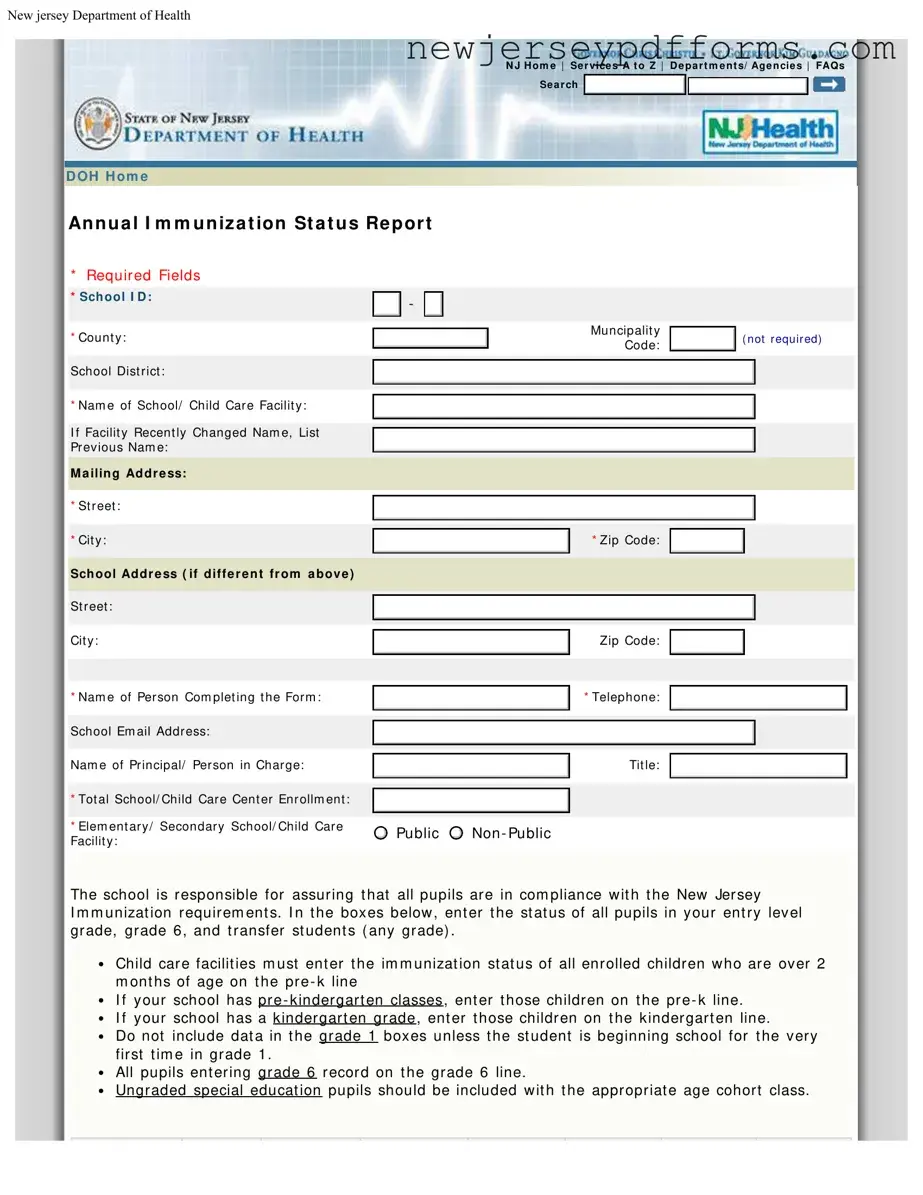The New Jersey Annual Immunization Report form bears similarities to the Student Health Record. Both documents serve to track the health status of students, particularly their immunization history. The Student Health Record collects essential health information, including vaccinations, allergies, and medical conditions, ensuring that schools maintain a comprehensive overview of each student's health. Just as the Annual Immunization Report focuses on compliance with state vaccination requirements, the Student Health Record aims to safeguard the health and safety of all students within the school environment.
Another related document is the Certificate of Immunization. This certificate is often required for school admission and provides proof that a child has received the necessary vaccinations. Like the Annual Immunization Report, it includes specific details about the vaccines administered, dates, and any exemptions. Both documents are crucial for ensuring that children are protected against preventable diseases, thereby promoting public health within educational settings.
The Immunization Exemption Form is also similar, as it addresses situations where a child may not be vaccinated due to medical or religious reasons. This form requires parents or guardians to provide documentation supporting their exemption request. In this way, it parallels the Annual Immunization Report by ensuring that schools have accurate records of all students, including those who are exempt from vaccination requirements.
The Health and Immunization History form shares common ground with the Annual Immunization Report, as it gathers comprehensive health data on students. This form typically includes details about past illnesses, allergies, and vaccinations. Both documents are essential for schools to assess the overall health of their student population and to ensure compliance with health regulations.
Similarly, the School Health Services Report is another document that focuses on the health status of students. It provides an overview of health services provided to students throughout the year, including immunization rates. Like the Annual Immunization Report, it plays a critical role in evaluating the effectiveness of health programs within schools and ensuring that students meet state health requirements.
In addition to these important health documents, it is essential for limited liability companies (LLCs) to have their own foundational agreements, such as an Operating Agreement, which outlines the management structure and procedures. For more information about this crucial document, you can visit topformsonline.com/operating-agreement/.
The Child Care Immunization Record is akin to the Annual Immunization Report, particularly for early childhood education settings. This record tracks the immunization status of children enrolled in child care facilities. Both documents aim to ensure that children are protected against infectious diseases, making them vital for maintaining public health standards in educational environments.
The Vaccination Status Report is another similar document that focuses on tracking vaccination compliance among students. This report is often used by health departments to monitor immunization rates in schools and identify areas that may need additional outreach or education. Like the Annual Immunization Report, it serves as a tool for public health officials to assess community health and ensure that children are receiving necessary vaccinations.
The Annual Health Assessment Report also shares similarities with the Annual Immunization Report. This report encompasses a broader range of health metrics, including nutrition and physical fitness, in addition to immunization status. Both reports are essential for schools to evaluate the overall health of their students and identify any areas that may require intervention or support.
The School Nurse Report is another relevant document, as it provides insights into the health services provided to students, including immunization compliance. School nurses often compile this report to track health trends and address any health-related issues that arise during the school year. Like the Annual Immunization Report, it plays a significant role in maintaining the health and safety of the student body.
Finally, the Public Health Immunization Registry is similar in that it serves as a centralized database for tracking immunization records across various schools and health facilities. This registry allows health officials to monitor vaccination rates and ensure compliance with state mandates. Both the registry and the Annual Immunization Report are essential tools for promoting public health and safeguarding the well-being of children within the community.

